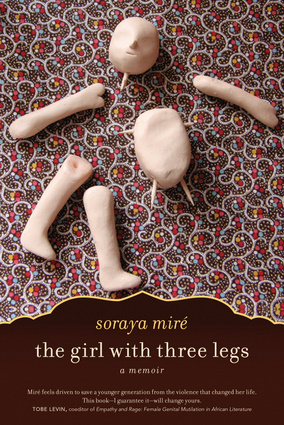Suggested reading from Chicago Review Press
 Mother's Day Mother's Day |
 Father's Day Father's Day |

 |
A Memoir
By Soraya Miré
BIOGRAPHY & AUTOBIOGRAPHY
400 Pages, 6 x 9
Formats: Cloth, PDF, EPUB, Mobipocket
Cloth, $26.95 (US $26.95) (CA $29.95)
ISBN 9781569767139
Rights: WOR
Chicago Review Press (Oct 2011)
Lawrence Hill Books
Overview
“I have known two kinds of pain. The first, a stabbing between my legs, the second, reliving it to tell my story.” —Soraya Miré
Having experienced firsthand the horror of female genital mutilation (FGM), Soraya Miré reveals the personal violation and immense challenges she overcame. This book is at once an intimate revelation, a testament to the empowerment of women, and an indictment of the violent global oppression of women and girls. This forthright narrative recounts what it means to grow up female in a traditional Somali family, where girls' and women's basic human rights are violated on a daily basis. Forced into an arranged marriage to an abusive older cousin, Miré was also witness to the instability of Somalia's political landscape—her father was a general in the military dictatorship of Siad Barre. In her journey to recover from the violence done to her, Miré realizes FGM is the ultimate child abuse, a ritual of mutilation handed down from mother to daughter and protected by the word “culture.” Despite the violations she endured, her words resonate with hope, humanity, and dignity. Her life story is truly one of inspiration and redemption.
Reviews
“Stunning and excruciating yet lyrical. . . . Miré feels driven to save a younger generation from the violence that changed her life. This book—I guarantee it—will change yours.” —Tobe Levin, W. E. B. Du Bois Institute for African and African American Research, Harvard University, and coeditor of Empathy and Rage: Female Genital Mutilation in African Literature
“I could not put this book down. . . . Miré is unstoppable. She does not spare anyone: not herself, not her family, not her culture. . . . The book is an ode to female courage and healing against high odds; it is about the high cost of that courage, which includes being ostracized, death-threatened, impoverished, and treated as a ‘crazy’ woman when she is at her sanest and most heroic.”—Phyllis Chesler, clinical psychologist, feminist icon, and bestselling author of Women and Madness, Woman’s Inhumanity to Woman, and Mothers on Trial
“Quite simply, amazing. Soraya Miré puts a beautiful face on the tragedy of female genital mutilation and chronicles so clearly why we all, women and men alike, need to hold hands and end the mutually destructive practice of FGM.”—Marci L. Bowers, MD, gynecology, pelvic and reconstructive surgery, surgical reversion of FGM
“I recall how Soraya was attacked inside the UN by male African delegates after testifying about FGM. An arm slashed out past the hand-stitched lapels and elegant garments of other delegates, smacking Soraya’s shoulder. The man’s eyes burned with hate: How dare she testify about FGM! How dare she not!” —Wilda Spalding, president, International Human Rights Consortium
Author Biography
Soraya Miré is a human rights activist, a filmmaker, and a survivor of and spokesperson against the practice of female genital mutilation (FGM). Her documentary film Fire Eyes, which explored the socioeconomic, psychological, and medical problems associated with FGM on a global scale, was shown at the Sundance Film Festival, the International Women's Conference in